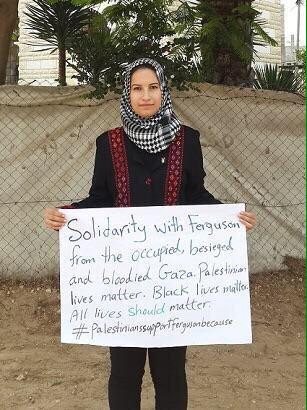To the members of the American Studies Association (ASA)
We here at the American University chapter of Students for Justice in Palestine would like to extend our thanks to all members of the ASA for supporting the academic boycott against Israel. We know that it was not one that was undertaken lightly and that both the ASA and its individuals members have been met with severe backlash for their actions.
The humiliation and the suffering of the Palestinian people continues on a daily basis. Less than a week ago, an 85-year-old Palestinian man died after a tear gas canister was shot into his home, the first Palestinian death of the new year and the latest in a long line of civilian casualties as a result of the actions of Israeli forces, stretching all the way back to the Deir Yassin Massacre. Since 1948, the Palestinian people have been stripped of their land, homes, dignity, and self-determination. The Occupation, which has been ongoing in West Bank since 1967, only serves to make the daily life of the Palestinians more difficult.
Historically, such crimes have been whitewashed by the State of Israel with the help of Israeli academic institutions. However, the American Studies Association recently made the brave decision to boycott Israeli academic institutions that have long been complicit in maintaining the Israeli occupation and denial of basic Palestinian rights. This is a tremendous step forward not only for academic freedom but for justice and peace, the ideals of which have evaded citizens of Israel and Palestine for far too long.
It is curious that supporters of Israel decry the decision by the ASA as a step backward for academic freedom when those same people have time and time again attempted to stifle the voices of those who dared to speak out again the actions of the state of Israel, oftentimes with the help of Israeli academic institutions. Contrary to their actions, the decision by the ASA is not meant to stifle the voices of those who would oppose it. Rather, it is meant to allow for the possibility of nuanced debate regarding Israel and Palestine by granting a voice to the Palestinian cause that has long been denied.
However, what those who criticize the ASA on the grounds that it is stifling academic freedom are truly missing is the one basic truth that ultimately, this decision is not about academic freedom at all but about restoring human rights to those in Israel and Palestine to whom they have long been denied. It is a widely accepted fact that those living in Israel and Palestine are not granted equal rights and that this is unacceptable.
As Alex Lubin, associate professor of American Studies at the American University of Beirut, puts it “Academic freedom means very little when it takes place in a context of segregation and apartheid”. The decision by the ASA shines a much needed light on the ugly apartheid system that has become a part and parcel of Israeli society, a system that must be corrected.
In the 1960s, a group of brave academics began the academic boycott of South Africa as a means to pressure the South African government to abandon its apartheid system. Back then, these scholars faced the same criticisms that the ASA is facing today, from charges that such boycotts damage academic freedom, or that the educational institutions are the wrong targets. However, the actions of these academics are validated today, with the collapse of the South African Apartheid. We encourage all supporters of the academic boycott to stand strong and not give in to pressure, enormous at it may be. There is no doubt that in the future, the actions taken by the ASA will, too, be vindicated.
-Students for Justice in Palestine, American University




.jpg)
